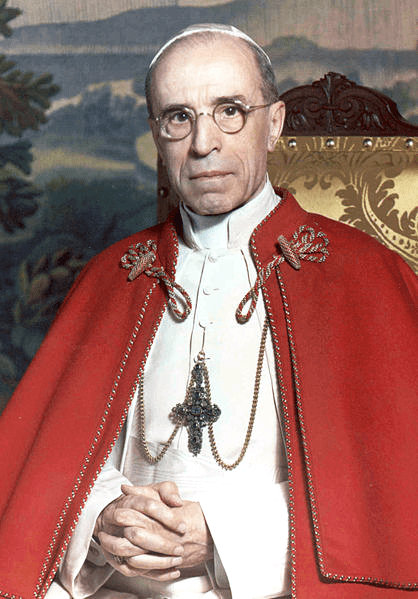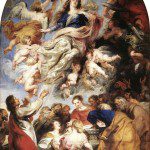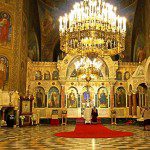Venerable Pope Pius XII (r. 1939-1958) [public domain / Wikimedia Commons]
***
(1-27-12)
***
[from a Facebook discussion. My opponent‘s words will be in blue ]
It is not explicitly scriptural (passing on of the office), but it doesn’t have to be. I would argue that it is common sense and straightforward deduction from other passages in the Bible about offices and succession. Peter is constantly portrayed in the Bible as the leader of the apostles.
There is a succession of Church offices: they are said to be perpetual in the Church. Judas defects and they choose Matthias to continue his function. Paul appears to pass on his office to Timothy (2 Tim 4:1-6).
Now, if Peter is given these keys, and it has the meaning as suggested by all these commentators in my paper, then it is simply common sense to assume that this was intended to be a permanent office in the Church. You could argue that this lone office of all offices discussed in Scripture was strictly temporary: confined to Peter alone, but I don’t think it makes any sense. Why would there be a leader of the Church for Peter’s lifetime only, and then there is to be no leader for all of the rest of history? I made a more extensive argument for papal succession elsewhere.
The only problem with assuming “common sense’ in application of revealed realities is that common sense doesn’t always fit or apply: for example, the true presence in the Holy Eucharist – it defies and even seems in opposition to “common sense” yet is the reality . . . it required divine revelation to know this . . . so one can’t rely on common sense as always having validity in things of Jesus. :)
I don’t think that objection works because the Eucharist is an acknowledged mystery that goes beyond reason (without contradicting it). The papacy is an office, and not a mystery in terms of not being able to fully be rationally understood. It takes faith to believe in the office, just like anything else in the Bible, but common sense applies to how the office was to be “worked out” through history. People often reject the papacy not because it isn’t understood, but because it is understood and they don’t like the notion of being in submission to a final authority in matters of faith.
It’s like the scenario in John 6: some disciples thought it was too difficult to accept Real, Substantial, Bodily Presence and so they split. They didn’t simply misunderstand it; they rejected it. They lacked faith in Jesus; no longer totally trusted Him.
If you disagree with my rationale for common sense as an argument in favor of papal succession, then by all means try to overthrow my reasoning. Simply saying that the Eucharist is a mystery sidesteps the point and is not a sufficient analogy, I humbly submit. We see succession in several ways in Scripture. The only thing that remains is to determine if and how that also applies to the papal office.
How the Christians worked it out through history certainly suggests that they thought the papacy was a perpetual office.
Why do you require that it has to be explicitly scriptural in the first place? It does not. To require such a thing is pure Protestant sola Scriptura reasoning (itself massively unbiblical and unreasonable) What is it in my reasoning that is implausible as an interpretation of the scriptural data we do have?
It’s not a merely human mandate if it is the perpetuation of an office divinely established (Matthew 16), by analogy to the perpetuation of all other offices in Scripture. I’m asking why anyone would make a special case for the papacy and assume it is to cease, while all other offices continue?
One either believes that God established the office of the papacy to lead the Church at all times or not. Many lack the faith to believe that; they disbelieve in that dogma of the Church: based on the biblical data. If someone disbelieves it, I think they run into many serious problems in the Bible itself: some of which I am briefly enumerating here.
This is, of course, also one of the Orthodox arguments that are made: the papacy was a mere human happenstance rather than a divinely mandated office: intended by God to be perpetual. I don’t buy it. I think it fails to take into account many considerations such as the cross-referencing in my post above.
It is implicit in Scripture by massive analogy. You have to take into account the analogy of Scripture with regard to other offices.
What do you personally believe? Was the papacy instituted by God or not? If not, you deny Matthew 16.
If you say it was established by God in Matthew 16 and Jesus’ commissioning of Peter, but it was not perpetual (because you don’t find that to be plausible based on lack of explicit Scripture: which is a Protestant methodology), you have to explain the seeming absurdity of God establishing a Church office, only to have it die an early death with the death of Peter. That makes no sense to me at all.
If it makes sense to anyone, I’d like to understand how they conceptualize such a thing in their heads, given what we see in the Bible. I have always found the anti-papal arguments based on the Bible rather weak and inexplicable and desperate.
I don’t argue against the papacy . . . I simply observe that taking the office beyond Peter is a human reasoning within the institution . . . one that is not unreasonable . . . yet also one not able to show a direct teaching of it by Jesus . . . that’s all I point out . . . it is more than open to evolution, change and even devolution as it has been such since the death of Peter . . . who knows where it will go in the future for the sake of ecumenical inter-communion . . . most relevant in these days where secular/social culture is anti-all-religion.
As an example of analogical argument, it was argued in the paper above by many Protestant commentators, that Jesus was hearkening back to the earlier office of prime minister to the king. That office did indeed have succession.
In effect, then, it would be like saying, “I am establishing, with you as the first office-holder, an office that is akin to the monarchy of England.”
In American culture, we know what the English monarchy is, and was, and that it is an office of succession. That is understood in the very notion of the thing. Likewise, the Jews understood His reference to the keys, because it was a thing in their own Scripture, that they were familiar with.
If the direct analogy understood in the commission refers to an office itself inherently possessing succession, as a matter of historical fact, then it follows straightforwardly that the analogical office presently being established is also one of succession. That’s not even just common sense (there are two distinct arguments to be made here). It is purely logical and based on facts concerning the thing that is the basis of the analogy.
And in that sense it is even strictly explicit in Scripture. Only the analogy is not explicit, but it is very clear and strong, which is why all these commentators are all talking about it, as the “key” to understand the passage in the context of its ancient Hebrew / OT background (pun intended).
I have just shown, I think, that it indeed was a “direct teaching of Jesus” by a compelling inescapable analogy to what he was referring to in the OT office that was the keyholder. So I disagree with you about the fact of it.
You seem to not grasp how analogical, scriptural cross-reference / exegetical reasoning applies in this case, because you keep sidestepping my various biblical arguments.
All I’m doing (ironically) is following the reasoning of the Protestant scholars. Obviously they have no stake in the papacy. They are just calling it as they see it, as Bible commentators and exegetes. That’s why the argument is so strong, because it’s not based on Catholic dogma; it’s based on Protestant biblical exegesis: sort of a “hostile witness” scenario.
I leave my reasoning to other readers who will see what I’m arguing (and accept it), I think.
Dave . . . the reality is I am not arguing against the papacy at all. :)
Right. You simply redefine it. I know the game well . . .
Dave, the papacy has been re-defined often in its 2000 year history . . . and not by “me” . . . but even by Rome itself.
*
. . . in the sense of consistent development of dogma, not inconsistent evolution of dogmas (that you referred to), which has been condemned by the Church.
*
It developed, with complete consistency; two completely different things. Evolution of dogma was condemned by the Church. Pope St. Pius X commended Newman’s view of development at the same time he condemned evolution of dogma. I had a whole debate about it with an anti-Catholic Calvinist, who claimed that the two views are identical. Wrong!
Yeah; it’s different: in the way an oak tree is different from an acorn, or you and I are different from what we were one minute after we were conceived.
*
Nothing essential in the papacy is changed at all. Vatican II: Lumen Gentium, III, 22 states:
But the college or body of bishops has no authority unless it is understood together with the Roman Pontiff, the successor of Peter as its head. The pope’s power of primacy over all, both pastors and faithful, remains whole and intact. In virtue of his office, that is as Vicar of Christ and pastor of the whole Church, the Roman Pontiff has full, supreme and universal power over the Church. And he is always free to exercise this power. The order of bishops, which succeeds to the college of apostles and gives this apostolic body continued existence, is also the subject of supreme and full power over the universal Church, provided we understand this body together with its head the Roman Pontiff and never without this head. This power can be exercised only with the consent of the Roman Pontiff. For our Lord placed Simon alone as the rock and the bearer of the keys of the Church, and made him shepherd of the whole flock; . . .
And in III, 25:
And this infallibility with which the Divine Redeemer willed His Church to be endowed in defining doctrine of faith and morals, extends as far as the deposit of Revelation extends, which must be religiously guarded and faithfully expounded. And this is the infallibility which the Roman Pontiff, the head of the college of bishops, enjoys in virtue of his office, when, as the supreme shepherd and teacher of all the faithful, who confirms his brethren in their faith, by a definitive act he proclaims a doctrine of faith or morals. And therefore his definitions, of themselves, and not from the consent of the Church, are justly styled irreformable, since they are pronounced with the assistance of the Holy Spirit, promised to him in blessed Peter, and therefore they need no approval of others, nor do they allow an appeal to any other judgment. For then the Roman Pontiff is not pronouncing judgment as a private person, but as the supreme teacher of the universal Church, in whom the charism of infallibility of the Church itself is individually present, he is expounding or defending a doctrine of Catholic faith.
The pope works together with bishops and Councils; of course; but He is the supreme head in a way in which they are not. “. . . therefore his definitions, of themselves, and not from the consent of the Church, are justly styled irreformable . . .”
It’s the same old conciliarist claptrap: to try to deny this and pretend that the Council or a vote of bishops is on a par with the pope. They are not. Vatican II is completely consistent with Vatican I: it merely developed the role of the Council and the layperson more. Both are consistent with Trent; and all three councils with the Bible.
Development of doctrine is a completely biblical concept, as I have demonstrated in many papers (one / two / three).
So the pope delegates; so what? That is no disproof of his supreme authority at all, since God Himself delegates. Jesus delegated His apostles to represent Him directly. Does that mean He had less authority in so doing? Nope. “He who receives you receives me” (Matt 10:40; cf. Jn 13:20). “He that hears you hears me” (Lk 10:16). “. . . we are ambassadors for Christ . . .” (2 Cor 5:20).
*
That’s not true, Michael. Historically, papal legates were at most ecumenical councils. The pope need not be present to have authority. He has it by virtue of being pope. Period. This is neither inconsistent with Vatican I or II nor the historic Church all the way back to Nicaea.
Now you are not debating “me” but Vatican I’s definition of papal authority. So take it up with those long deceased council fathers and pope.
Sheer nonsense. I have backed up everything I have said, with Scripture, reason, and Church documents. But you keep giving simply your own opinion backed up by nothing. Readers may decide where the truth lies.
Sheer nonsense is what you are proffering . . . I simply stated Vat. I teaching on Papal authority . . . you do not accept it . . . and I agree it is largely ignored by even the pope. It is not my opinion . . . it is simply the way it is. The institutional structure rests more on the old Roman Empire and emperor than on Jesus . . . I am not implying that the gospel does, but the ecclesial structure does . . . but as I said, you can see it as you wish to.
I may indeed. And I see it as an orthodox, faithful Catholic, who accepts all that the Church teaches me, and who wishes to think with the Mind of the Church rather than cultural happenstance or the fashionable finger-in-the-wind zeitgeist.
I have no dispute with that. I am an Orthodox believer myself . . . I just comment on the human aspects and gravitate toward the Christ ones more . . .
You are Eastern Orthodox?
[no reply]
***














